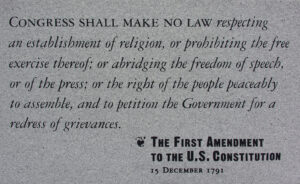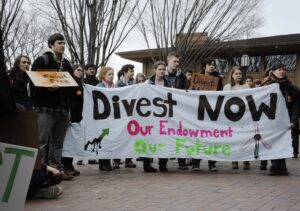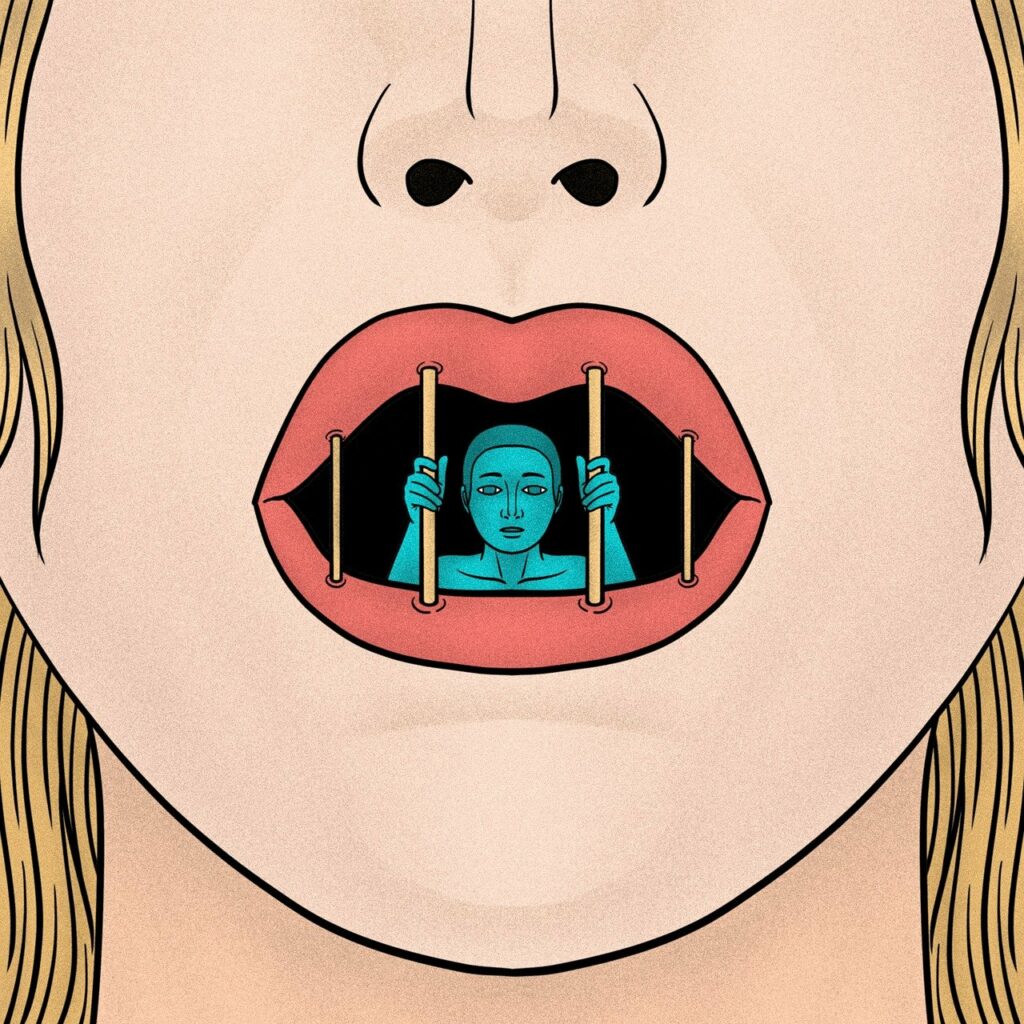With technology and social media, we have the whole world at our fingertips in a way incomparable to anything before. We can share stories, gain insights, and learn about events from across the globe in mere seconds. Given this ease of access to information, it is no surprise that more and more young people champion politics, encourage voting, and step into advocacy.1 However, in recent years, campus environments and restrictive anti-BDS (“Boycott, Divestment, and Sanctions”) laws are challenging students with unique obstacles. The problem of censorship is not new to academia, but it now manifests itself in different ways–by extending novel legal restrictions and laws that make the price of speaking up on certain topics prohibitive, especially for campuses. Did you know that student group activities might jeopardize a campus from receiving federal financial aid or even prevent an individual from qualifying for future Texas Tuition Equalizing Grants?

Passed in May of 2023, US Senate Bill 1637 “provide[s] for nonpreemption of measures by State and local governments to divest from entities that engage in certain boycott, divestment, or sanctions activities targeting Israel or persons doing business in Israel or Israeli-controlled territories, and for other purposes.”2 Additionally, Texas SB 13 and Texas SB 19 are two more laws intended to limit any speaker’s ability to express an opinion by restricting discussion on fossil-fuel energy companies and firearm entities and trade associations, respectfully.3 Texas Attorney General Ken Paxton wrote in a statement about these bills in October of 2023, stating that “given the recent brutal Hamas terrorist attacks against Israel, it is more important than ever to enforce public policy supportive of one of America’s closest allies and a beacon of freedom in the Middle East.” 4

Statements like these, especially ones that depend on trigger words to impose fear, create harmful one-sided narratives that condemn any opposing views. These attempts at censorship and these biased implications follow trends in our divided nation as a whole. In universities and colleges across the country, student advocacy groups who dare to speak up for Palestinian civilians are receiving threats and becoming targets of legal action emboldened by these previously innocuous laws. The world of academia has fallen so far behind in its fight to uphold free speech and promote true academic freedom. This current of self-censorship is reaching students in an unprecedented way.

“Academic freedom empowers and even obligates academics to inform free expression in universities to help advance knowledge and better serve the needs of democratic societies,” states Amy Lai in her 2023 book In Defense of Free Speech in Universities: A Study of Three Jurisdictions.5 Universities, once a place for individuals to openly share ideas, research, findings, opinions, and perspectives, have become the battlefield for censorship. Academic censorship in the United States has begun to transform in recent years, and Texas remains a powerful forerunner in implementing Conservative political agendas. In addition to the censored, limited, and carefully carved curriculum and rhetoric imposed in the selection of history books and in other fields, the enforcement of these bills directly curtails academic freedom under the guise of anti-discrimination against a previous target of prejudice and intolerance.
In late March of 2024, Texas Governor Greg Abbott issued Executive Order No. GA-44, to address acts of antisemitism in higher education.6 However, the continued failure of our politicians to differentiate between advocacy for human dignity and the protection of children and civilians versus antisemitism, in regards to the Middle East conflict, has paralyzed the international community in its ability to ensure measured response to the October 7th attacks, and challenges students’ ethical responsibility as the civic consciousness of campuses. In fear of being deemed antisemitic, being blacklisted, or being otherwise ostracized, students are forced to either remain silent by the executive orders, or risk putting themselves and their campuses in direct line of attack.

“[T]he new tools that make progress possible, as you know, can also be used to hold it back. Those who seek to repress their own people and to export hate and fear, are as savvy as this next generation of human rights activists,” stated former United Nations U.S. Representative Samantha Power in her 2013 address delivered at the Fourth Estate Leadership Summit, her first speech after conceiving this title.7 Power, who held this position until 2017, now serves as the current Administrator of the United States Agency for International Development and remains very keen on the importance of upholding our civic duty of advocation. During this address, she stated that “while the UN has done tremendous good in the world, there are times when the Organization has lost its way, when politics and ideology get in the way of impact.” The same might now be said about the world of academia. When legislations threaten to restrict students and campus organizations with the withdrawal of state and national funding, a void is created, replacing genuine discussion with an echo-chamber. Dissenting voices are silenced, and student advocacy is at best muffled–but at worst, it is punished. Laws and restrictions like US Senate Bill 1637, Texas SB 13, and Texas SB 19 contribute to a narrative that dehumanizes the powerless further and justifies any action from the other side, losing our humanity.
“That’s why we need your positive moral vision more than ever. We need your vision of justice to win over those who fear it. We need your vision of freedom to overwhelm those who rely on repression. We need your vision of equality and tolerance to overcome those who propagate division and terror. And we need you to act so that that vision—your vision—prevails,” stated Powers in that same address.
The United States does not face this rampant censorship in isolation. “Since 2002, twenty countries have introduced new restrictions on the freedom of civil society groups to operate, learning from one another in a global marketplace of ideas that shares the bad as well as the good,” states Power. Student groups in particular are facing a challenge unique to the current time. “Publicly funded institutions play a role in maintaining a robust dialogue and autonomous citizenry, and as such […] the government should be required to afford a degree of independence to institutions and speakers, even if they only exist as a result of government funding,” argues Nicole Comparato in her 2017 University of Miami Law Review article “Combatting Institutional Censorship of College Journalists.”8
The forced silencing of the academic world should hit exceptionally hard for students in religiously sponsored institutions. Despite preaching and teaching about human dignity, peace, love, and acceptance exemplified by most religions, we are living at a time when an individual can be punished and repudiated for advocating for even a simple ceasefire, deterring students from speaking up. In his “Urbi et Orbi” Easter Sunday message on March 31st, 2024, Pope Francis called for us to see “the path of life in the midst of death, the path of peace in the midst of war, the path of reconciliation in the midst of hatred, the path of fraternity in the midst of hostility.”9 But how can we see these provident paths when few can afford to advocate for an end to the conflict?
“I appeal once again that access to humanitarian aid be ensured to Gaza, and call once more for the prompt release of the hostages seized on last October 7th and for an immediate cease-fire in the Strip. […] How much suffering we see in the eyes of the children: the children in those lands at war have forgotten how to smile! With those eyes, they ask us: Why? Why all this death? Why all this destruction?” urged Pope Francis.
Students across the world are left with similar questions. How can an issue be presented to us in such a one-sided way that we are legally prevented from calling for peace? Who can reverse this? It should not be controversial to say that war is wrong or to call for a ceasefire, so why is it illegal in Texas and in the United States to call for an end to it when certain parties are concerned?
“War is always an absurdity, war is always a defeat! […] Let us not yield to the logic of weapons and rearming. Peace is never made with arms, but with outstretched hands and open hearts.” Pope Francis

Until changes are made regarding these restricting state and federal laws, the potential consequences of speaking up will continue to instill fear in students, discouraging them from upholding their ethical responsibility to act out their civic consciousness. How can our Constitutional First Amendment withstand this direct slicing away of freedom of expression in a country founded on this principle? Students, responsible citizens, and people whose faith, values, or morals require respect for the human dignity of all are forced to ask ourselves whether, despite the possible repercussions of exercising our freedom of speech, we should stand and risk everything to fight against these laws.
- https://circle.tufts.edu/2022-election-center#youth-turnout-second-highest-in-last-three-decades. ↵
- “Combating BDS Act of 2023,” US Senate Bill 1637, 118th Congress, § 1, (2023). https://www.congress.gov/bill/118th-congress/senate-bill/1637/all-info. ↵
- “An act relating to state contracts with and investments in certain companies that boycott energy companies,” Texas SB 13, (Texas 2021). https://capitol.texas.gov/tlodocs/87R/billtext/html/SB00013F.HTM and “An act relating to prohibited contracts with companies that discriminate against the firearm or ammunition industries,” Texas SB 19, (Texas 2021). https://capitol.texas.gov/tlodocs/87R/billtext/html/SB00019F.HTM. ↵
- Paxton, Ken. “Advisory on Texas law prohibiting contracts and investments with entities that discriminate against firearm entities or boycott energy companies or Israel.” Attorney General of Texas, October 18, 2023. https://www.texasattorneygeneral.gov/sites/default/files/images/executive-management/OAG%20advisory%20on%20SB%2013%20and%2019%2010.18.23.pdf. ↵
- Lai, Amy. In Defense of Free Speech in Universities: A Study of Three Jurisdictions. University of Michigan Press, 2023. JSTOR, https://doi.org/10.3998/mpub.11442022. ↵
- TX Exec. Order No. GA-44. “Relating to addressing acts of antisemitism in institutions of higher education.” March 27, 2024. https://gov.texas.gov/uploads/files/press/EO-GA-44_antisemitism_in_institutions_of_higher_ed_IMAGE_03-27-2024.pdf. ↵
- Power, Samantha. “You Are Not Just Young People.” Vital Speeches International, vol. 5, no. 9, Sept. 2013, pp. 241–43. EBSCOhost, research.ebsco.com/linkprocessor/plink?id=759a8d4d-ff4d-35e1-b12b-bc47d0e3aa50. ↵
- Comparato, Nicole. “Combatting Institutional Censorship of College Journalists: The Need for a Tailored Public Forum Category to Best Protect Subsidized Student Newspapers.” University of Miami Law Review, vol. 71, no. 2, Winter 2017, pp. 528-vi. HeinOnline, https://heinonline.org/HOL/P?h=hein.journals/umialr71&i=546. ↵
- https://www.vatican.va/content/francesco/en/messages/urbi/documents/20240331-urbi-et-orbi-pasqua.html. ↵




8 comments
Eugenio Gonzalez
Your article was excellently written, and I believe you picked an excellent topic. Interestingly, in many cases, censorship actually provides fuel to the censored group, which seems counterproductive to the institution’s goals; I learned a lot about a topic I was unfamiliar.
Sebastian Hernandez-Soihit
Very conscice and thought provoking article about the consequences of censorship and the power that university students have to make all voices heard- St.Mary’s had a legacy of this and it’s good to know how do we as a university fit into this narrative
Madison Hinojosa
The article is exceptionally well written, effectively highlighting the reality that we, as individuals, often find ourselves in a position where we must make sacrifices in one aspect of our lives solely to appease the expectations and norms of society. An observation that sheds light on the delicate balance we must strike between our desires and the external pressures that surround us. This constant tug-of-war between prioritizing our own needs and fulfilling societal expectations can be mentally and emotionally taxing. It prompts us to reflect on the complexities of our existence and the nuances of navigating social dynamics.
Naya Harb
I really love the topic you chose. Sadly, what is happening in the world today is heartbreaking. Big universities are trying to stop their students of protesting for what they believe is right. It is unfair and it is the complete opposite of freedom of speech and expression. I love your confidence and your determination in writing this. Great job and congratulations on being nominated!
Isaac Fellows
I think it’s interesting how any attempt to block speech always seems to harm the credibility of the institution engaging in the perceived censorship. In many cases, it actually gives fuel to the group being censored… it’s almost counter-productive to the goals of the institution. In addition, I also wonder how we can promote more civic discourse at our own University. Many public schools have a culture which enables protest and demonstration… from my experience, St. Mary’s does not. Are there active policies prohibiting this, or are students here just disinterested?
lvaldez12
The way this article captured made the idea fit perfectly with what is going on in the world right now especially in Texas right now is amazing. Even just by stating laws and bills that many of us might not have know about prior to reading this article. For instance i would of never knew that Texas made it a bill that we can’t speak out about gun control which is something I didn’t know was a true bill.
Jonathan Flores
This article was extremely well written, and I think you chose a great topic. Unfortunately, it seems like we often have to sacrifice an element of our freedom in order to gain ground in society. As your wrote here, censorship is a huge issue in our present society, and when we seek a solution to one problem, it seems like another one emerges. However, I think your article also does a good job in showing that the battle is not over, and the fight for rights continues today. I was informed more on a topic I knew little about, and good job overall.
Vianna Villarreal
Very effective and super informative article! There are so many people in the United States who continue to be underrepresented and who feel they have no voice in advocating for rights they believe they should have. The government has become overly interested in what people have to say in very wrong ways.